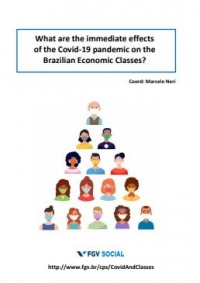
What are the immediate effects of the Covid-19 pandemic on the Brazilian Economic Classes?
About the research:
An empirical assessment on Brazilian economic classes based on factual data collected during the Covid-19 pandemic shows that the number of poor Brazilians has decreased by 13.1 million individuals between 2019 and July 2020 (considering poor those individuals with per capita income below ½ minimum wage). This represented an impressive fall of 20.69% in poverty rates, steeper than in previous periods of social boom in the country, such as after monetary stabilization plans (e.g. the Cruzado plan in 1986 and the Real plan in 1994). At the other end of the income distribution, the upper income range comprising people with at least two minimum wages per capita has diminished by 5.8 million people during the pandemic. The combination of the changes observed at the basis and the top of the distribution led to an increase in the intermediary income group. Thus, the middle-income segment in Brazil has grown by approximately 20.5 million people, almost half of Argentina’s population. The reductions observed in both ends of the distribution occurred due to the combination of the negative economic effects of the pandemic with the measures taken by the government to mitigate them, such as the implementation of an Emergency Grant targeted at the poor. We also noticed a larger poverty reduction in the North and Northeast regions, which contain the highest share of beneficiaries of the Emergency Grant.
In addition to these income changes, the PNAD Covid of July 2020 analyses people’s behaviour concerning the pandemic. The poorest segment of the population, which is eligible to the Emergency Grant offered by the government, presents the highest rates of social isolation, for example, 27.8% of the individuals in this group remained strictly isolated and 48.3% only left their homes in case of necessity – rates that are 4 or 5 percentage points higher when compared to the total population. These results suggest that the Emergency Grant has impacted not only the income of the target population but also their behaviour, addressing the social distancing challenge imposed by the pandemic. However, the Emergency Grant is not fiscally sustainable.
Site em Português / Site in Portuguese 
I VÍDEO (3 min) / VÍDEO (4 min) - In portuguese
| Contact: marcelo.neri@fgv.br / fgvsocial@fgv.br / Tel: +5521 37992320





